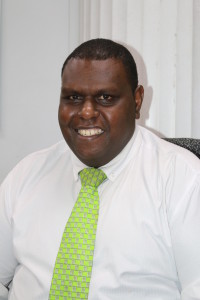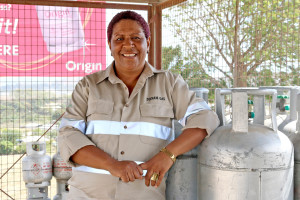Bank South Pacific’s SME manager, Dennis Konu, explains the bank’s innovative strategy for small-to-medium size businesses, and how he is relishing his role with the APEC Business Advisory Council (ABAC).

BSP’s Dennis Konu
Konu is Manager of Bank South Pacific’s (BSP) SME Retail Bank. He tells Business Advantage PNG that hosting ABAC gives PNG businesses an opportunity to witness regional best practice, especially in relation to finance and technology.
‘We had our first meeting in San Francisco this year,’ says Konu. ‘The second meeting is going to happen this week in Port Moresby, which will be the first time that PNG has actually hosted ABAC.
‘Some of the themes we discussed in San Francisco were quite relevant and I felt we were doing it already in PNG, particularly in regards to financial inclusion.’
E-commerce
Konu says Chinese representatives of ABAC have presented their experiences, knowledge and expertise in ecommerce, looking at how Chinese SMEs have accessed global markets through e-commerce.
‘They have expertise around platforms such as Alibaba, where there is a lot of non-banking transactions occurring that are giving SMEs access to global markets. That is something that we want to push, but in PNG we are in the very early stages.
‘Potential clients are: traditional sole traders, owner operators, “Mum and Dad operations,” partnerships, and companies that have turnover of less than $3 million kina.’
‘In PNG, you still have to look at connectivity issues, you still have to look at infrastructure issues and you still have to look at the literacy issues.’
Konu says BSP has established its SME Retail division to service the smaller end of the business market.
‘This is traditionally the area that doesn’t necessarily have access to loans and other banking products,’ he says.
‘They are not well catered for. So what BSP did, about four years ago, is make a decision that this is a growth part of the market. We need to have a business model that specifically targets these SMEs.’
PNG SMEs under-served
Konu says potential clients are: traditional sole traders, owner operators, “Mum and Dad operations,” partnerships, and companies that have turnover of less than K3 million. If income exceeds K3 million, they become corporate clients.

Helen Victor, BSP SME customer
‘There are challenges to the traditional model of business banking—they have issues keeping proper financial records,’ says Konu.
‘They probably don’t have robust people management systems. There is hardly any succession planning in a lot of these businesses.
‘It is mainly 100 per cent owner-operated businesses. If something happens to the owner, the business goes down the gurgler.’
‘Our loan product starts from $5,000 kina right up to $250,000 kina.’
Konu says BSP developed a model that would relate to the capacity of PNG small businesses.
‘It allowed us to introduce a lending product that is being accessed by this group now.
‘What we offer is the traditional transaction banking accounts, a debit card, access to internet banking and mobile banking.’
Loan product
‘Most importantly, we offer a loan product to these SMEs that, prior to the introduction of Smart Business (bank accounts), probably wouldn’t have had the opportunity to borrow. Our loan product starts from K5,000 right up to K250,000.
‘The good thing about this Smart Business model is that it is available from all the main branches and the sub-branches based in rural areas.
‘It gives them the opportunity to start building their financial footprint by having a bank account.’
‘What we have done with the loan is we have said: ‘Fine, if you can’t provide a finance statement for us to do a traditional assessment on your capacity to borrow, we will look at your cash flow history.
‘That is basically the cash flow that has gone through your bank account.
‘If an average SME wants to borrow, they have got to provide at least 12 months of bank statements which we analyse. That is how we calculate the debt serviceability.
‘It is about giving them that opportunity. But also, prior to that, it gives them the opportunity to start building their financial footprint by having a bank account.’








Speak Your Mind